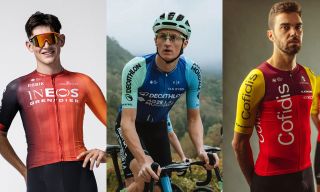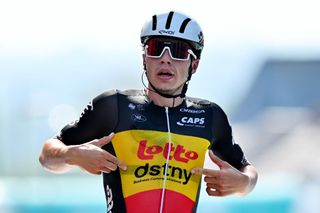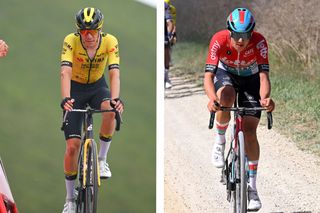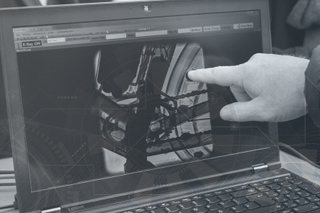Cancellara motors in Monaco parade
Spartacus pounds his way to maillot jaune; And guess what: Contador is right up there with him





















































































Pounding, pounding and pounding as if each turn of the pedals were grinding a mother cow through the mincer, Saxo Bank's Fabian Cancellara spun his legs the only way he knew how Saturday in Monaco, unleashing the beast within to capture the first maillot jaune of the 2009 Tour de France.
Following an uneventful start to the season, the atypical Swiss savagery that netted the 28-year-old prologue wins in the 2004 and 2007 Tours de France was once again used to full effect, maybe more so than before given the difficulty and distance of the 15.5-kilometre opening stage. And despite his newfound prowess in the mountains that a fortnight ago paved the way to his first Tour de Suisse title, it was perhaps the reason why this slightly trimmer Cancellara proved unbeatable.
"I think now, I'm really back," Cancellara said, whose winning time of 19:32 equated to a superlative 47.610 km/h average.
"I knew on the first uphill portion I should take it easy and not give it everything, not take in too much lactic acid till the top of the climb. [Directeur sportif] Bjarne Riis told me at the casino that I already started really strong, and then I rode my own pace and made the difference on the flatter parts."
Asked how long he wishes to be in yellow, he said, "As long as possible. But we have 3,500 km in front of us. We look to be in yellow at least till the [Stage four] team time trial. It would be nice to get it like London [in 2007], to have it for seven days. Let's enjoy now, but focus on what is coming."
On a course 7.5 kilometres too long to be called a prologue, the reigning Olympic time trial champion's winning margin of 18 seconds to Astana's Alberto Contador was nonetheless huge, the 2007 Tour champion stopping the clock at 19:50, second by one second to Bradley Wiggins of Garmin-Slipstream. Only another Astana-ite, Andreas Klöden, and last year's Tour de France runner-up, Cadel Evans of Silence-Lotto, posted times under the 20-minute mark, 19:54 and 19:55, respectively, the pair rounding out the top five places.
"I can be very happy about becoming second behind a rider such as him [Cancellara]," said Contador. "I'm happy with my result, because my objective was to distance myself from my rivals for the general classification. The differences are minimal, but the important thing is that I feel good, that my legs respond well. Now, the race can begin."
Carlos Sastre of the Cervélo TestTeam, the defending Tour de France champion, finished 1:06 behind his former teammate Cancellara, which doesn't rule him out of the race by any means, in 21st on the leader board. "My feelings on the bike were good, but I had a problem with my helmet after the start so this troubled my concentration a bit," said Sastre. "But apart from this incident, my feelings were good and I think that I didn't lose too much time on the important riders."
"What happened before was the hard thing," said Cancellara, "after my crash, after sickness, after not finding my form. I always told myself to look forward, because the season is long; Flanders was my main goal for the season, but I had to say no - I didn't find form. It's been a lot of training, a lot of sacrifice [since then].
"I think I made a great decision: ride the Giro [d'Italia], get kilometres in my body, ride with the team in the Alps, train behind the motorbike, do the Tour de Suisse without thinking how good I am already, but then I showing I am back [by winning the race]."
Significant others
Along with Lance Armstrong, Levi Leipheimer chose to set off early to avoid the threat of rain that never came, departing at 4:37 p.m., his overly hunched position unusual though powerful nonetheless. So powerful, in fact, that the 35-year-old Californian from Santa Rosa held the best time all the way until the 138th out of the scheduled 180 riders to leave - his teammate Klöden - bettered his time of 20:02, eventually slotting Leipheimer into sixth.
"Personally, I don't like to start hard, but you had to start hard on this course," Leipheimer said. "But it's kind of like, you're torturing yourself in the beginning, and then you absolutely have to kill yourself to a point of bleeding out of your ears later on. It's a controlled massacre. It's tough for me to start like that."
Seventh on Saturday, Liquigas' Roman Kreuziger can now be thought of as a dark horse, the 2009 Tour de Romandie winner's time of 20:04 just 32 seconds off the winning pace. "Everyone believes he is a champion in the making, one of the few riders who will be able to take on Andy Schleck," said five-time Tour de France champion, Bernard Hinault, in the official Tour de France guide.
Columbia-HTC's Tony Martin did threaten when he set the fastest intermediate time of 11:27 atop the Moyenne Corniche, the intermediate checkpoint coming after 7.5-km. But compared to Astana's Leipheimer who was three seconds slower at that point, the young German faded slightly over the course's back half, reversing his previous advantage and finishing with a time of 20:05 and eighth place.
The team who mysteriously lost their Tour de France champ in the year they won it, the eyes of Saxo Bank were not just glued to Cancellara but the man they believe to be their next winner-in-waiting, Andy Schleck. His lanky, skinny frame and relatively wide shoulders made not for a pretty sight on the time trial bike, but nevertheless rode well to limit his losses to one minute flat, equating to eighteenth-best, which he should be happy with.
And, of course, there was Lance...
Squatting low minutes before his 4:17 p.m. start, stretching his gluteus, then using the top tube of his Trek time trial bike like a ballet dancer would grip a bar, arms outstretched and pulling his torso rearwards to extend his back, Armstrong was going through the motions like a man on a mission: perhaps a mission to set the first stone in place en route to an eighth Tour de France.
The 37-year-old rocketed out of the start house just like he did 10 years ago at the '99 Tour, climbing the 7.2-km, Cat. 4 ascent to Beausoleil as if it was flat. The eighteenth rider to leave, it was unsurprising to see him qualify fastest at the halfway mark with 11:36 at the 7.5-km checkpoint. Flicking through the corners then powering on the straights back down to Port Hercule, he looked in control, strong, and impressive. By the day's end, his early best time of 20:12 was still good enough for tenth place.
"Very technical, [it was] hard to find the right rhythm, but I'm happy with my ride," said Armstrong, who appeared genuinely contented. "I didn't expect to win or take the [yellow] jersey. It wasn't a super, super performance, but not bad. I was nervous, which is logical. It's a long time since I had that emotion. I felt focused on the course."
Asked how it compared to his feelings four years ago, the last time he raced this great race that he won in 2005, he said, "It's almost like a foreign environment. It's difficult to replicate that intensity and that feeling in training, and I definitely didn't replicate that the last few years [during retirement].
"I'm happy. Even if we don't win [the Tour de France] I'm having a good time, and I want to be there. I have a lot of other things I could be doing right now, but I want to win a race," said Armstrong.
Leadership issues or not, with four riders in the top 10, Astana is the team to beat.
For images of stage one click here
Get The Leadout Newsletter
The latest race content, interviews, features, reviews and expert buying guides, direct to your inbox!
Most Popular


Latest on Cyclingnews
-
From Arkéa to UAE, these are the 2025 pro cycling team kits
French teams lead the way in new jersey design reveals as top teams also reveal new kits -
Lotto downsize for 2025: smaller roster, no Giro d'Italia but fight for WorldTour continues
'We are managing to survive on a budget closer to 15 million than 20 million' - says team manager Stéphane Heulot -
'This is how a rider transfer should work' - Red Bull-Bora-Hansgrohe CEO explains the difference between the team's two controversial mid-contract deals
Following clarification of Cian Uijdtebroeks and Maxim Van Gils mid-contract deals, Ralph Denk admits that he talked to Remco Evenepoel in September about a transfer -
A €600K X-ray, an ex-Homeland Security investigator, and a murky underworld: Can the UCI keep motor dopers away?
Having recently examined the current state of technological fraud in the pro peloton, Cyclingnews asks how the UCI plans to keep concealed motors out of cycling.



